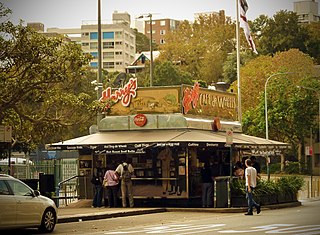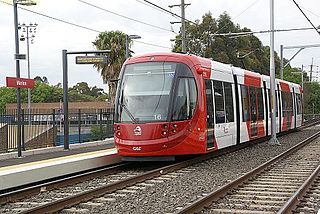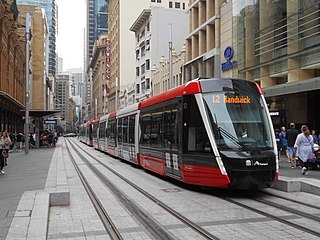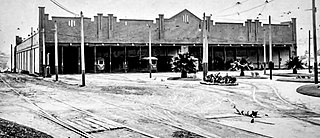
Central is a heritage-listed railway station located in the centre of Sydney, New South Wales, Australia. The station is the largest and busiest railway station in Australia and serves as a major transport interchange for NSW TrainLink inter-city rail services, Sydney Trains commuter rail services, Sydney light rail services, bus services, and private coach transport services. The station is also known as Sydney Terminal. The property was added to the New South Wales State Heritage Register on 2 April 1999. It recorded 85.4 million passenger movements in 2018 and serves over 250,000 people daily.

The Powerhouse Museum is the major branch of the Museum of Applied Arts & Sciences (MAAS) in Sydney, and owned by the New South Wales State Government

Locomotive No. 1 hauled the first passenger train in New South Wales, Australia. It was built by Robert Stephenson and Company. In 1846, the Sydney Railway Company was formed with the objective of building a railway line between Sydney and Parramatta. No. 1 was one of four locomotives that arrived by sea from the manufacturer in January 1855. The first passenger train hauled by No. 1 was a special service from Sydney Station to Long Cove viaduct on 24 May 1855, Queen Victoria's birthday.

Fort Macquarie Tram Depot was part of the Sydney tram network. It opened in 1902 on the site of the old Fort Macquarie and was demolished in 1958 to make way for the construction of the Sydney Opera House.

The Sydney tramway network served the inner suburbs of Sydney, Australia, from 1879 until 1961. In its heyday, it was the largest in Australia, the second largest in the Commonwealth of Nations, and one of the largest in the world. The network was heavily worked, with about 1,600 cars in service at any one time at its peak during the 1930s . Patronage peaked in 1945 at 405 million passenger journeys. Its maximum street trackage totalled 291 km in 1923.

Harris Street is the main thoroughfare in the Inner West suburbs of Pyrmont and Ultimo in Sydney, New South Wales, Australia. It runs from the northern tip of the Pyrmont peninsula to Broadway in the central business district. Harris Street was formerly lined by industrial sites such as the Ultimo Power Station, Ultimo Tram Depot and the Government Printing Office.

Harry's Cafe de Wheels is an iconic pie cart located on Cowper Wharf Road in Woolloomooloo, Sydney, Australia, near the Finger Wharf and Fleet Base East.

The Brisbane tramway network served the city of Brisbane, Australia, between 1885 and 1969. It ran on standard gauge track. The electric system was originally energised to 500 volts, and subsequently increased to 600 volts. All tramcars built in Brisbane up to 1938 had an open design. This proved so popular, especially on hot summer nights, that the trams were used as fundraisers and often chartered right up until the last service by social groups.

Rozelle Tram Depot is a former tram storage and operations centre that was part of the Sydney tram network. It is the largest remaining tram depot in Sydney. The depot was turned into the food-centric retail complex Tramsheds that opened in September 2016.

Sydney Bus Museum is a not-for-profit transportation museum and education centre for public benefit located in the suburb of Leichhardt, in Sydney, Australia.

The Sydney trolleybus system in New South Wales consisted of two unconnected lines in the Eastern Suburbs and St George areas of Sydney.

The city of Geelong in Victoria, Australia, operated an extensive tramway system from 1912 until 1956, when the service was replaced by buses. Unlike Victoria's other major regional cities, Ballarat and Bendigo, which have kept some track and trams as tourist attractions, no trams or tracks remain in Geelong.

The Inner West Light Rail is a 12.8-kilometre (8.0 mi) light rail line in Sydney, New South Wales, Australia, running from Central railway station through the Inner West to Dulwich Hill and serving 23 stops. It is the original line of the Sydney light rail network, and was originally known as Sydney Light Rail. Light rail services on the line are now branded as the L1 Dulwich Hill Line.

The CBD and South East Light Rail is a light rail line running between Sydney's central business district (CBD) and the south-eastern suburbs of Sydney, New South Wales, Australia. Construction commenced in October 2015, with services between Circular Quay and Randwick commencing on 14 December 2019 as the L2 Randwick Line, and between Circular Quay and Kingsford on 3 April 2020 as the L3 Kingsford Line. It is part of Sydney's light rail network.

The Sydney Steam Motor Trams were built for and operated by the New South Wales Government Tramways of Australia.

Randwick Bus Depot is a bus depot in the Sydney suburb of Randwick operated by Transdev John Holland.

Leichhardt Bus Depot is a bus depot in the Sydney suburb of Leichhardt operated by Transit Systems.

Tempe Bus Depot is a bus depot in the Sydney suburb of Tempe. It is currently operated by Transit Systems. The depot survived the closure of Sydney's former tram network and provided storage for the buses that replaced the trams.

Ridge Street Tram Depot was part of the Sydney tram network.

Rockhampton Council Tramways was a steam tram service which was operated by Rockhampton City Council from 1909 until 1939 in the city of Rockhampton, Queensland, Australia. Rockhampton was the only regional city in the state of Queensland to have had a tram service. The line has since been rebuilt and is operated as a tourist attraction by the Archer Park Rail Museum.




















